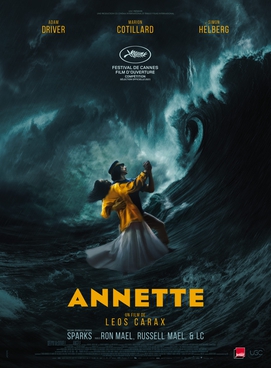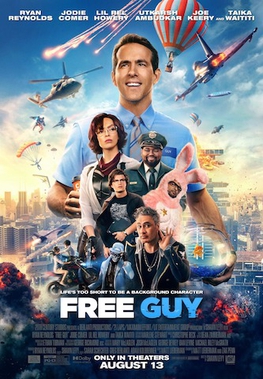
Annette, written by Ron Mael and Russell Mael of Sparks, and Carax.

Free Guy, written by Matt Lieberman and Zak Penn.
First one first. Annette is a musical disaster, but it is such a peculiar disaster that it’s actually interesting, and in a completely bizarre way, it’s saved by a puppet and perhaps by Adam Driver and Marianne Cotilliard’s naked bodies. The theme is moonlight, pop culture, parental abuse, male rage and drunkenness. You can look on Wikipedia for the entire plot, which is dull. (More or less A Star Is Born, as Marion Cotilliard’s career as an opera singer who dies in almost every performance becomes more famous, and Driver’s career as some kind of weird comedian gets lost in his internal rage — kind of like Lenny Bruce — until he is finally, thankfully, booed off the stage.) At that point, they have already made love, in a gorgeously filmed sex scene where their white and hairless bodies look ghostly and strange, had a girl baby, performed by a puppet, who seems preternaturally thoughtful, and sung many awful songs. The end doesn’t matter, except like Pinnochio, the little girl puppet, who has managed to put her father in prison, turns into a real young girl with an astonishing ability to sing.
Ultimately, there is no point to the movie. There is no internal reflection and it’s not even clear what either of the parents want (the third adult in the movie is the puppet/girl’s probable father and he has a very clear want, but the film makers turn him into a passive participant in his own death, so that bit was ruined). Adam Driver can barely sing — though he sings better than Russell Crowe in Les Miserables. I thought Cotilliard’s singing was dubbed, but I wasn’t sure. The very young girl at the end — the live version of the puppet — was extraordinary for the fact that she could sing, but is so young she can’t pronounce the words properly. Most people, leaving the theatre, were amused by the piece. But it’s basically a musical written by a not very good band.
Free Guy I had wanted to see because I once read a story that was told from the point of view of NPCs in a video game. Normally, Non Player Characters (NPCs) just walk around in the background of a video game completely ignorant of the Players that are trying to kill each other. They’re not even “ignorant” because that would imply consciousness. They are no more animated than the trees or grass of the game which might, depending on the people coding the game, move a little. This story tries to take “blue shirt guy” and make him “real” — also like the puppet from the movie above — by linking him to a core component of the programming, which was an attempt at AI (artificial intelligence). In the real world McKees (Joe Keery) and Millie (Jodie Comer) are the creators of this AI programming and Millie has launched a multi-million dollar lawsuit against their boss (an insufferable Taika Waititi), who has stolen their code and embedded it in a secret place inside the world of the game, which is called… I can’t remember. But the difference is that in a normal MMORPG game, you can’t interact or do anything with the NPC unless they have a specific purpose, like to sell you a drink or a toy or a piece of equipment. In this game, you can kill, maim or harass any NPC you want. Well one day this guy, “Blue Shirt Guy,” played by Ryan Reynolds in his usual dim way, wakes up. He doesn’t know he’s in a game, yet, but he does know that he can do things differently. And that begins his transformation — not from puppet to human, but from computer code to slightly more aware computer code. If the movie had been at all interesting, they might have tackled subjects like “Is a computer code that is self aware considered to be alive, and what might the obligations be for us to keep that universe alive?” As technology nerds continue to work on AI, they might, if they were smart enough or moral enough, actually have to ask themselves this question. It’s already been brought up several times and the movies I can think of right now are three: AI, by Spielberg, and the two Blade Runner movies. A book is Never Let Me Go, by Ishiguro. And of course, P.K. Dick addressed this in so many ways. Blade Runner is based on his novel, Do Androids Dream of Electric Sheep. I’m sure Isaac Asimov addressed the question — perhaps in 2001: A Space Odyssey, with the computer HAL being heartbreakingly aware of itself and its own slow murder. Star Trek (the ones with the android Data) also tried to tackle this thorny question and eventually just gave him the rights of all humanity and even tried to let him age a little. Alien, in most of its versions, gave us an android that was almost always a villain, even when he seemed heroic as happened in Alien: Prometheus (heroic) and Alien: Covenant (back to evil).
But the movie was entertaining and slightly funny. Ryan Reynolds is always nice to look at and I wonder what will happen in five or six years when he’s not so good looking. I also wondered if people my age would even understand it. The terminology of young people and the way they talk now is so different and strange. They speak in acronyms and are plugged into their music all day. I’m not sure this movie will work for anyone who isn’t young. I happen to know some of these terms. But when the “real world” decides to “reboot the server” in order to change the game to its original factory settings, does anyone who’s not worked in technology even understand what that means? When they are searching for the AI code inside the game itself, does it even make sense to someone who has no experience with technology, other than looking at the cracked screen of their cellphone? And will anyone even notice the reference to The Shining when Antwan decides to take an axe to all the servers in the server room. I don’t think so. This is a world where people don’t want to take a vaccine because they fear they will be tracked and traced by a secret microchip, and they express this fear while they hold their cell phone in their hand.
